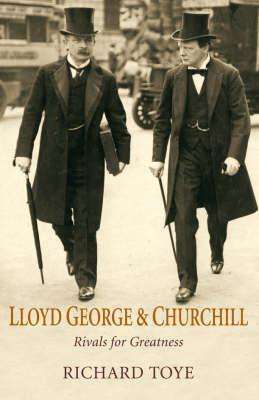
Lloyd George and Churchill: Rivals for Greatness
Check my rate
| Main centres: | 1-3 business days |
| Regional areas: | 3-4 business days |
| Remote areas: | 3-5 business days |

| Main centres: | 1-3 business days |
| Regional areas: | 3-4 business days |
| Remote areas: | 3-5 business days |
Published by Macmillan, 2007, hardcover, index, 504 pages, illustrated, condition: as new.
The two most significant British political figures of the twentieth-century, Churchill and Lloyd George were political rivals but personal friends. Between them their ministerial careers spanned seventy years and two world wars. Althought they could not have been more different temperamentally, and often disagreed violently about politics, theirs was `the longest political friendship in the life of Great Britain` and Churchill was the only person outside his family to call Lloyd George `David`. Richard Toye`s book is a dynamic account of their relationship. Drawing on diaries and letters, some never before published, (there are more than 1,000 pieces of correspondence between the two men), he explores their long-standing friendship and rivalry, the impact they had on each other`s careers, and the fate of their respective reputations, arguing that Lloyd George`s major achievements have been undeservedly overshadowed, in part as a consequence of Churchill`s later mythmaking. It is a major work from a brilliant young historian.
The author, Richard Toye is a British historian and academic. He is Professor of History at the University of Exeter. He was previously a Fellow and Director of Studies for History at Homerton College, University of Cambridge, from 2002 to 2007, and before that he taught at University of Manchester from 2000.
This book ' Lloyd George and Churchill: Rivals for Greatness' was the winner of the Times Higher Young Academic Author of the Year Award. It received widespread critical acclaim from a number of newspaper reviews for its "nuanced" approach. One of the judges, June Purvis, professor of women's and gender history at Portsmouth University, said:
This is an extremely readable, lively book that explores the complex personal and political relationship between two great male politicians who helped to shape 20th-century Britain. The changing shades and hues of their relationship are documented in fascinating detail.